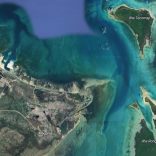Gemfields confirms G-Factor for Mozambique's Montepuez ruby mine and Zambia's Kagem emerald mine
Mozambique: IEA flags coal output risks from intense rainfall, climate change

File photo: Lusa
The International Energy Agency (IEA) warned on Tuesday that coal production in Mozambique could be further reduced due to rainfall and the impact of climate change, calling on the country to improve its warning system.
“Coal production in Mozambique is likely to be exposed to increasingly intense rainfall, flooding and excessive precipitation that could affect or even suspend mining activities, increasing the risk of flooding and waterlogging of mines,” said Rita Madeira, the IEA’s Africa Programme Manager.
She was speaking in Maputo at the presentation of the IEA’s National Climate Resilience Assessment of Mozambique, during Energy and Climate Week in the Community of Portuguese Language Countries (CPLP), which runs until Friday.
“Floods can disrupt coal transport by rail and decrease coal quality due to high moisture content. Already in 2018, heavy rains affected the coal production capacity of two mines in Mozambique, leading to a downward revision of annual coal production,” said Madeira, citing the National Climate Resilience Assessment.
The International Energy Agency considers that Mozambique is taking important steps to increase climate resilience, especially by investing in renewable energies. The agency is moving forward with concrete investments and asking the country to strengthen its disaster prevention strategy with improved monitoring and warning systems.
The experts recommend that the country move forward with grid interconnection in the southern and northern regions, including the modernisation of infrastructure. They note that this is a step towards reducing the impact of cyclones on electricity supply.
The IEA also pointed out that “to reduce the risks, damage and loss of energy assets, it would be essential to include projections of changes in climate patterns related to floods and droughts in the location of new projects”.
The Energy and Climate Week in the Community of Portuguese Language Countries (CPLP), which runs until Friday in Maputo, brings together government representatives, regulators, financiers, companies and experts in the field of energy and climate.
The Lusophone Renewable Energy Association (Aler) and the Association of Energy Regulators of Portuguese-Speaking Countries (Relop) coordinate the event.
Mozambique is considered one of the countries most vulnerable to and severely affected by climate change. During the rainy season, it experiences cyclical floods and tropical cyclones.
The government said this month that from 2000 to 2023, the country recorded more than 75 extreme weather events, causing economic losses of more than €3.8 billion. These events placed the country among the 10 most vulnerable in the world.
Mozambique’s government has approved a contingency plan for the 2025/2026 rainy season, which it acknowledges could affect 1.2 million people. However, the plan has less than half of the 14 billion meticais (€190 million) needed.
The Mozambican authorities warned in September of floods of “great magnitude” in the country and flooding on at least four million hectares of farmland during the rainy season that began this month in Mozambique.












Leave a Reply
Be the First to Comment!
You must be logged in to post a comment.
You must be logged in to post a comment.